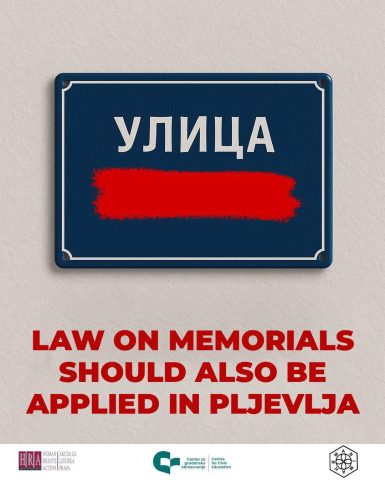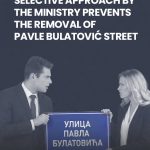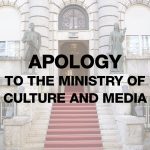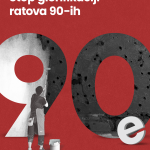
PROSECUTION MUST ACT PROMPTLY ON DEATH THREATS, HATE SPEECH AND OTHER HATE-MOTIVATED CRIMES AND KEEP THE PUBLIC INFORMED
30/10/2025
DETERMINE THE REASONS FOR THE INACTION OF STATE AUTHORITIES IN THE CASE OF THE ILLEGAL MONUMENT TO PAVLE ĐURIŠIĆ
04/11/2025LAW ON MEMORIALS SHOULD ALSO BE APPLIED IN PLJEVLJA

Non-governmental organizations – the Human Rights Action (HRA), the Centre for Civic Education (CCE), and the Centre for Women’s and Peace Education ANIMA – have called on the Ministry of Culture and Media to react to the unlawful renaming of streets in the Municipality of Pljevlja.
In a letter sent yesterday to the Minister of Culture and Media, Tamara Vujović, we expressed our support for the Ministry’s efforts to remove illegally erected memorials, but also reminded that there has been no information on whether any action was taken regarding the local authorities in Pljevlja naming streets after JNA or Yugoslav Army soldiers – Branko Krvavac, Vukoman Tešić, Đurko Bojović, and Eldin Hrapović – without the Ministry’s approval. We also requested an examination of the legality of the 2000 decision by the Municipality of Pljevlja to name a street after Pavle Bulatović.
Decisions that violate the law and promote ideologically driven revisionism must not go unanswered by institutions. Such actions open the door to the glorification of wartime history, undermine democracy and the rule of law, deepen divisions within the multiethnic community of Pljevlja, and damage Montenegro’s international reputation.
HRA, CCE and ANIMA also expressed disagreement with the position of the Ministry’s Commission for Memorials that Patriarch Varnava Rosić and Second Lieutenant Predrag Peđa Leovac meet the criteria prescribed by law, since their biographies are controversial and incompatible with Montenegro’s antifascist and civic values. A monument to Leovac has already been erected in Pljevlja, and a memorial to Rosić is expected to be built soon in the same town.
The Commission stated about Leovac: This proposal not only preserves the heroism of Second Lieutenant Leovac from being forgotten but also expresses respect for all known and unknown heroes who, in similar circumstances, stood on the line of defence of their country according to their oath and sense of duty. His deed serves as an example to future generations and as a continuation of the glorious tradition of Montenegrin ancestors. However, this approach is problematic for several reasons. First, the glorification of Leovac ignores the fact that other units of the Yugoslav Army were widely involved in war crimes and ethnic cleansing of Albanian civilians in Kosovo, as established by the Hague Tribunal, while Leovac himself died as a soldier of that same army, left to fight under harsh conditions. His death is tragic, but not to be glorified. Like many of his peers, he was thrust into a war he could not refuse, compelled to fight without the power to oppose the decisions of the then authorities.
A similar misunderstanding of the historical context was shown by the Commission in the case of Patriarch Varnava Rosić. Particularly concerning is the Commission’s failure to recognize the ethical and historical controversy surrounding Patriarch Rosić, whose antisemitic views and praise of Hitler are documented, as well as his close ties to the Chetnik movement. We remind that the Law on Memorials explicitly prohibits erecting monuments to persons who collaborated with occupiers, promoted fascist, chauvinist, or Nazi ideas, or played a negative role in the history of Montenegro or humanity.
Tea Gorjanc Prelević, Executive Director, Human Rights Action (HRA)
Ervina Dabižinović, Coordinator, Centre for Women’s and Peace Education ANIMA
Daliborka Uljarević, Executive Director, Centre for Civic Education (CCE)







 English
English